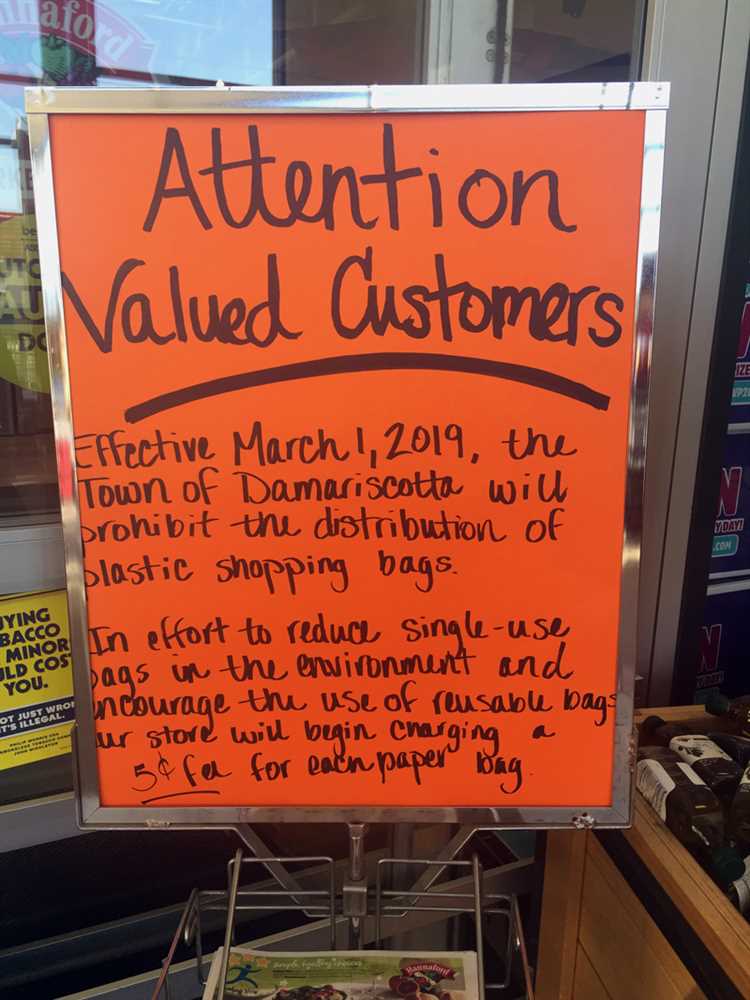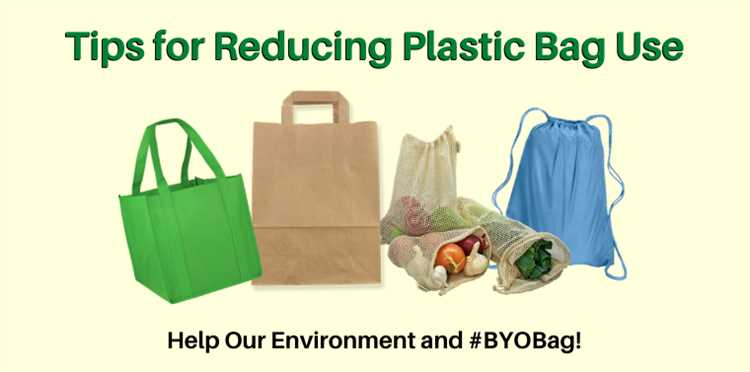Paper bags have become a popular alternative to plastic bags owing to their biodegradable nature and reduced environmental impact. As such, many stores and businesses have started offering paper bags as an option for customers. However, a common dilemma arises when stores charge more than the specified 5 cents for paper bags.
In many places, there are specific laws and regulations in place that determine the fees for both plastic and paper bags. While the fees for plastic bags are often higher in order to discourage their use, paper bags typically carry a lower fee or are even provided for free as an eco-friendly option. However, there are instances where stores charge more than the designated amount, which creates confusion among consumers.
It is important to note that store policies regarding bag fees can vary depending on the region and local regulations. Some areas have strict guidelines that specify a fixed fee, while others give stores more flexibility in setting their own prices. This means that the price of paper bags may vary from store to store.
If you find yourself in a situation where you are being charged more than the standard rate for paper bags, it is advisable to inquire with the store management or consult local authorities to clarify the situation. Understanding the regulations surrounding bag fees can help you make informed decisions and contribute to a greener environment.
- Are stores legally allowed to increase the cost of paper bags?
- Reasons for allowing stores to increase the cost of paper bags
- Possible consequences of increasing the cost of paper bags
- Environmental impact of paper bags
- Regulations on paper bag pricing
- 1. Price limits
- 2. Bag fee exemptions
- Exceptions to the paper bag pricing rule
- 1. Exemptions for low-income customers
- 2. Certain types of bags
- Compliance and penalties
- Implementation and monitoring
- Question-answer:
- Can stores charge more than 5 cents for paper bags?
- Why do stores charge more than 5 cents for paper bags?
- Is the 5 cent charge for paper bags a legal requirement?
- Do all stores charge for paper bags?
- Are there any exemptions or discounts for the bag fee?
- Can stores charge more than 5 cents for paper bags?
Are stores legally allowed to increase the cost of paper bags?
In many places, there are regulations in place that limit the amount that stores can charge for paper bags. These regulations are often put in place to encourage people to bring their own reusable bags and reduce the use of disposable bags, which can be harmful to the environment. While the specific regulations vary depending on the jurisdiction, it is common for stores to be required to charge a small fee, typically around 5 cents, for each paper bag provided.
However, it is important to note that these regulations may not apply uniformly across all jurisdictions. Some areas may have stricter regulations that prohibit stores from charging more than a certain amount, while others may not have any regulations in place at all. Additionally, exemptions may exist for certain types of stores or for specific situations.
Reasons for allowing stores to increase the cost of paper bags

- Encouraging the use of reusable bags: By increasing the cost of paper bags, stores can incentivize customers to bring their own reusable bags. This helps reduce the consumption of disposable bags and ultimately lessens the environmental impact.
- Offsetting the cost of providing paper bags: Charging a fee for paper bags can help offset the expenses incurred by the store for purchasing and providing them. This can include the cost of production, handling, and disposal.
Possible consequences of increasing the cost of paper bags
While there are valid reasons for allowing stores to increase the cost of paper bags, there can also be potential drawbacks or consequences.
- Financial burden on customers: Increasing the cost of paper bags can place an additional financial burden on customers, especially those who may not have access to reusable bags or are in situations where they need to rely on paper bags.
- Unintended consequences: In some cases, increasing the cost of paper bags may lead to unintended consequences such as an increase in the use of alternative disposable bags or a decrease in overall customer satisfaction.
Overall, the legality of increasing the cost of paper bags varies depending on the jurisdiction and the specific regulations in place. It is important to consult local laws and regulations to determine the allowable cost for paper bags in any given area.
Environmental impact of paper bags

Paper bags have long been marketed as a more environmentally friendly alternative to plastic bags. While paper bags are biodegradable and can be recycled, they still have a significant environmental impact.
One of the main concerns with paper bags is deforestation. The production of paper bags requires the cutting down of trees, which contributes to habitat destruction and loss of biodiversity. Additionally, the process of turning trees into paper bags involves chemicals and energy-intensive manufacturing processes.
Another issue with paper bags is their carbon footprint. The production and transportation of paper bags result in greenhouse gas emissions, contributing to climate change. In fact, paper bags have been found to have a higher carbon footprint compared to plastic bags.
Furthermore, the recycling of paper bags is not as efficient as it may seem. Paper bags can only be recycled a limited number of times before the quality of paper degrades, and they eventually end up in landfills. The recycling process itself requires water, energy, and chemicals, which further add to the environmental impact.
Despite these concerns, paper bags do have some advantages over plastic bags. They are made from a renewable resource and are less likely to end up in oceans and other wildlife habitats. However, it is important to consider the full life cycle of paper bags and their impact on the environment.
Regulations on paper bag pricing

Many jurisdictions have implemented regulations on paper bag pricing in an effort to reduce plastic waste and promote sustainability. These regulations aim to encourage the use of reusable bags and discourage excessive consumption of single-use paper bags.
1. Price limits
One common regulation is to put a maximum price limit on paper bags. For example, stores may be allowed to charge a maximum of 5 cents per paper bag. This limit ensures that consumers are not being overcharged for paper bags and encourages them to bring their own reusable bags instead.
2. Bag fee exemptions
In some jurisdictions, certain groups are exempted from paying for paper bags. These groups typically include low-income individuals who may not have the financial means to purchase reusable bags. By exempting these individuals, the regulations aim to prevent any undue burden on those who cannot afford to pay for bags.
| Location | Maximum Bag Price | Exemptions |
|---|---|---|
| California | 25 cents | WIC and CalFresh recipients |
| Oregon | 5 cents | SNAP and TANF recipients |
| New York | 5 cents | Those participating in the Special Supplemental Nutrition Program |
These regulations vary from jurisdiction to jurisdiction, so it is important for consumers to familiarize themselves with the specific rules in their area. By understanding the regulations, consumers can make informed choices and contribute to the reduction of plastic waste.
Exceptions to the paper bag pricing rule
While most stores are required to charge at least 5 cents for paper bags under state laws, there are some exceptions to this pricing rule. These exceptions vary depending on the specific state and local regulations. Here are a few common exceptions:
1. Exemptions for low-income customers
Some states have implemented exemptions for low-income customers who receive public assistance. These customers may be eligible to receive paper bags free of charge, regardless of the 5 cent pricing rule. This allows individuals who cannot afford to pay for additional bag fees to still have access to bags when shopping.
2. Certain types of bags
In certain states, specific types of paper bags may be exempt from the 5 cent pricing rule. For example, bags that are used for packaging loose items, such as bulk foods, may not fall under the pricing regulations. Additionally, bags used for prepared foods or items that require additional protection may also be exempt.
It’s important to note that while these exemptions exist, they may not be applicable in all areas. Local regulations can vary, so it’s essential for stores to familiarize themselves with the specific laws and exemptions in their particular region.
Compliance and penalties
In order to ensure compliance with regulations regarding the price of paper bags, authorities may conduct periodic inspections of stores to ensure they are charging no more than the allowed amount. Stores found to be charging more than the legal limit may be subject to penalties and fines.
Penalties for non-compliance can vary depending on the jurisdiction and the severity of the offense. In some cases, stores may receive warnings or be required to rectify the pricing issue immediately. Repeat offenders or those found to have intentionally violated the regulations may face larger fines or other more serious consequences, such as the suspension or revocation of their business license.
Implementation and monitoring
In order to effectively enforce the regulations and monitor compliance, authorities may establish systems for reporting violations and investigate any complaints received from consumers or other stakeholders. These systems can help identify stores that are not adhering to the price limits and allow authorities to take appropriate action.
Additionally, educational campaigns may be conducted to inform both retailers and consumers about the regulations regarding paper bag pricing. By raising awareness, authorities aim to foster a culture of compliance and ensure that stores and customers understand their rights and responsibilities.
Question-answer:
Can stores charge more than 5 cents for paper bags?
Yes, stores are allowed to charge more than 5 cents for paper bags. This fee, commonly known as a bag fee, is intended to encourage customers to bring their own reusable bags and reduce plastic waste. The actual amount of the fee can vary depending on the store and its location.
Why do stores charge more than 5 cents for paper bags?
Stores charge more than 5 cents for paper bags to incentivize customers to bring their own reusable bags. By implementing a higher bag fee, stores hope to reduce the consumption of single-use bags and encourage more sustainable shopping practices. The fee also helps offset the store’s cost for providing the bags.
Is the 5 cent charge for paper bags a legal requirement?
No, the 5 cent charge for paper bags is not a legal requirement in all areas. Some states and municipalities have implemented laws or ordinances that require stores to charge a fee for paper bags, but it may not always be exactly 5 cents. The specific law and fee amount can vary depending on the jurisdiction.
Do all stores charge for paper bags?
No, not all stores charge for paper bags. The requirement to charge for bags can vary depending on the location and the specific laws or regulations in place. Some stores may choose to offer bags for free, while others may charge a fee for both paper and plastic bags, or only for certain types of bags.
Are there any exemptions or discounts for the bag fee?
There may be exemptions or discounts for the bag fee depending on the store and the jurisdiction. For example, some stores may provide free bags for certain types of items, like raw meat or produce. Additionally, some jurisdictions may offer discounts on the bag fee for customers who participate in certain programs or use reusable bags.
Can stores charge more than 5 cents for paper bags?
Yes, stores can charge more than 5 cents for paper bags. The 5 cent charge is a minimum requirement set by certain cities or states to encourage customers to bring their own reusable bags. However, some stores may choose to charge a higher fee for paper bags to cover the cost of purchasing and providing them to customers.